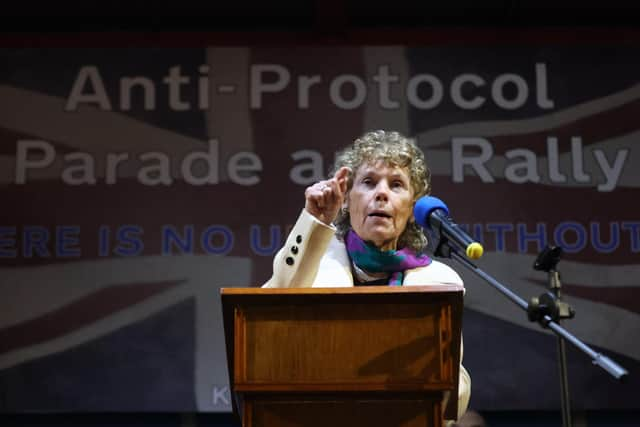Delay of NI Protocol Bill could lead to another six months without government in Northern Ireland
and live on Freeview channel 276
The bill which seeks to amend the NI Protocol is to have its second reading at the House of Lords tomorrow - a debate which is expected to last more than six hours.
The News Letter understands that Lord Cormack will put forward a motion to delay the NI Protocol Bill from going into committee by six months.
Advertisement
Hide AdAdvertisement
Hide AdBaroness Hoey, who will be present for tomorrow’s second reading of the NI Protocol Bill, said: “If it gets delayed for six months because Lord Cormack is arguing that gives time for more negotiations, that’s a recipe for no restoration of devolution.


“I’m very happy to support those who think nobody should go back into Stormont until we’ve got the protocol sorted.
“It’s quite a clever move by Patrick Cormack, he’s saying ‘we’re not stopping the bill, we’re giving it a second reading, but we’re not going to allow it to go any further until we’ve been a bit nicer to the EU or the EU has been a bit nicer to us’.”
Baroness Hoey said that more than 62 members were due to speak at the second reading of the bill, which takes place tomorrow at 3.30pm and is likely to go on until around 10pm.
Advertisement
Hide AdAdvertisement
Hide AdShe said that a six month delay would ultimately mean six months without a devolved government in Northern Ireland: “We will be continuing to point out to the Lords that anyone who tries to delay the protocol bill is just introducing another chasm in the Belfast Agreement. We can’t have the protocol and the Belfast Agreement, we can’t have the protocol and devolution.
“They need to realise that, in fact I think it will make the DUP even more determined not to go back in if they do that [delay the bill].”
Lord Cormack told ‘The Nolan Show’ last week that he would be proposing an amendment to allow "negotiation of up to six months during which we can sort this out with our European friends and neighbours".
Baroness Ritchie, will also be at the second reading of the bill, and unlike Baroness Hoey she is opposed to the over-riding of the NI Protocol.
Advertisement
Hide AdAdvertisement
Hide AdShe said: “The NI Protocol Bill is contrary to democratic principles, breaches international law, gives ministers powers in regulations for which there will be no parliamentary scrutiny or accountability and will wreak endless havoc on our economy.
"Just look at the dairy industry which is all island in nature and where the large part of the processing capacity lies in the south of Ireland. A dual regulatory regime would not work for that sector, will lead to the destruction of the dairy industry on the island and a similar case will exist for beef.
“I support the protocol and believe that there is a need for mitigations to ensure that it works to its full potential for everyone. Where wrinkles exist they need to be smoothed out. Only negotiations between the UK Government and EU will examine and resolve those.”
Meanwhile a joint report produced by academics at Queen’s University and the University of Michigan say the bill poses a “significant threat” to human rights protections.
Advertisement
Hide AdAdvertisement
Hide AdResponding to the report, a UK Government spokeswoman said: “The Bill is consistent with our obligations in international law – and in support of our prior obligations to the Belfast Good Friday Agreement.”